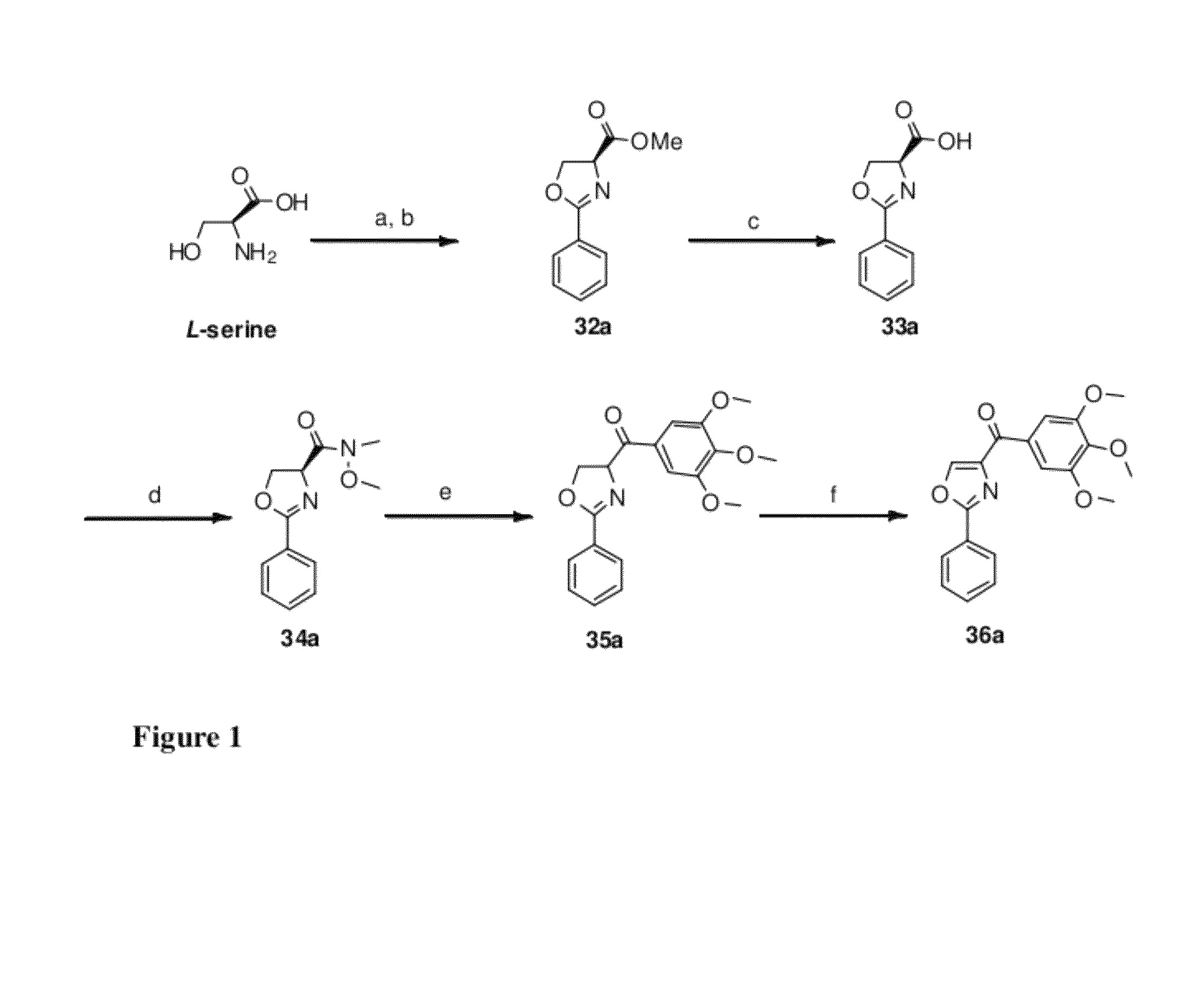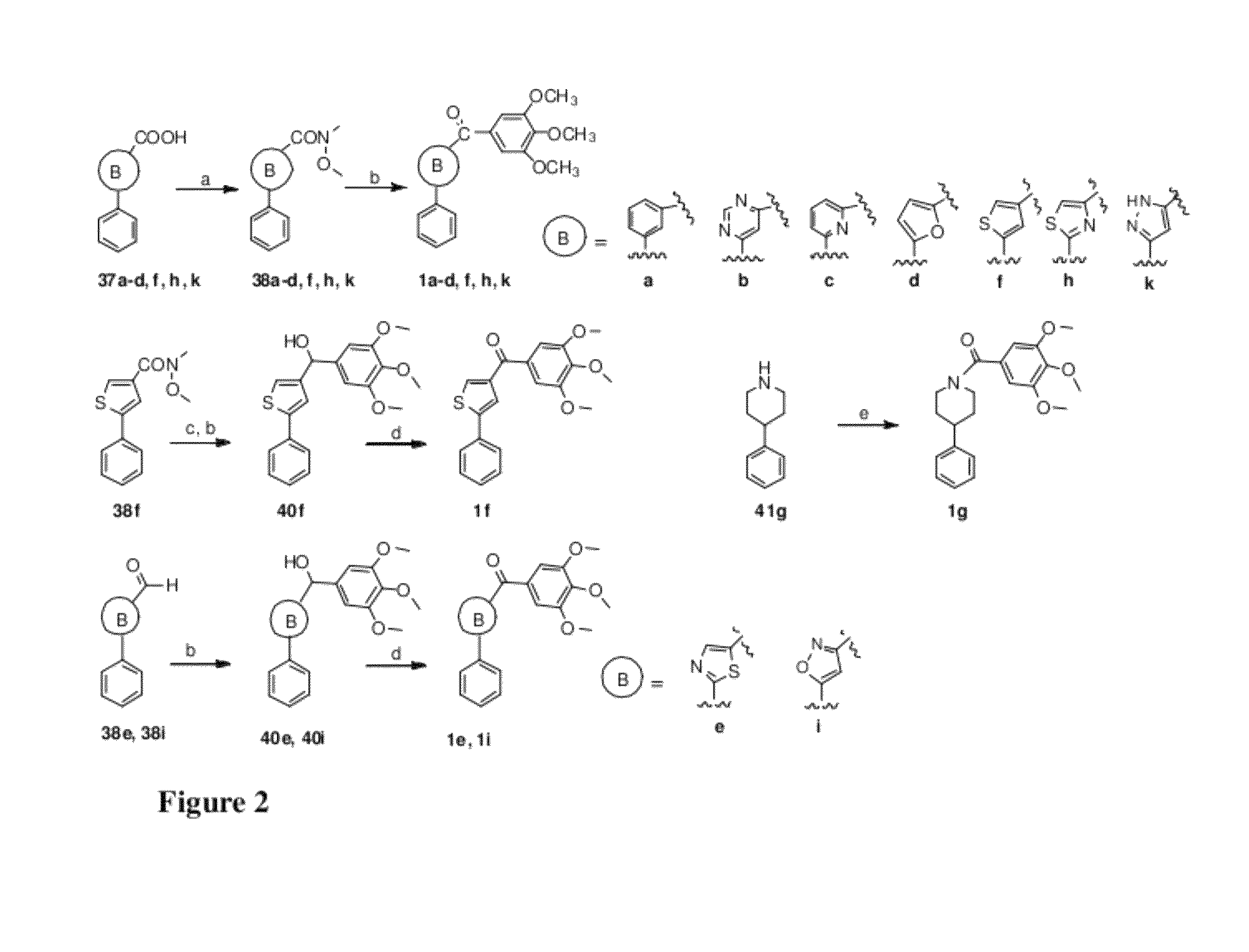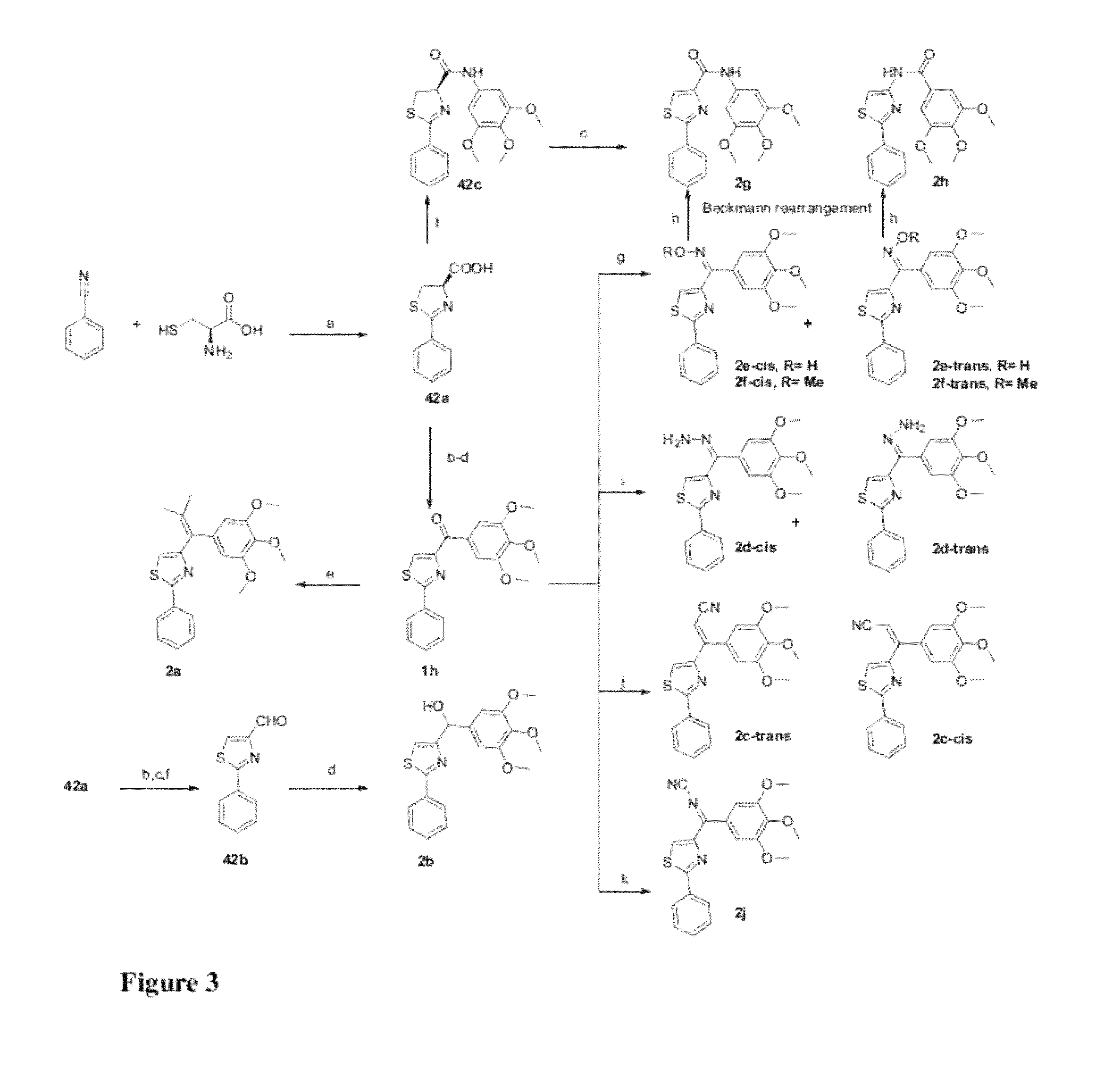Compounds for treatment of cancer
a cancer and compound technology, applied in the field of compounds with anticancer activity, can solve the problems of limited success in co-administering p-gp modulators or inhibitors to increase cellular availability by blocking the action of p-gp, lack of solubility in aqueous systems, and low efficacy, so as to reduce the severity, inhibit cancer, and reduce the risk
- Summary
- Abstract
- Description
- Claims
- Application Information
AI Technical Summary
Problems solved by technology
Method used
Image
Examples
example 1
Synthesis of B Ring Variant Compounds
B ring variant compounds were synthesized according to FIGS. 1 and 2.
Oxazole B Ring:
Synthesis of (2-Phenyl-oxazol-4-yl)-(3,4,5-trimethoxy-phenyl)-methanone (36a) (FIG. 1)
[0391]
(2R)-2-Phenyl-4,5-dihydro-oxazole-4-carboxylic acid methyl ester (32a)
[0392]Acetyl chloride (6.8 mL) was added dropwise to ice-cold methanol (30 mL). After the addition of L-serine (0.48 mmol), the reaction mixture was warmed to room temperature (RT) and stirred overnight. Evaporation of the solvent gave white solid (2R)-3-hydroxy-2-methyl-propionic acid methyl ester. HCl salt, which was used without purification in the next step. Triethylamine (11 mL, 72.3 mmol) was added slowly to a solution of ethyl benzimidate hydrochloride (11.6 g, 62.8 mmol) in CH2Cl2 (150 mL). The reaction mixture was stirred at RT for 30 min and (2R)-3-hydroxy-2-methyl-propionic acid methyl ester HCl salt (13.5 g, 79.6 mmol) was added by portion. The resulting mixture was stirred for 48 h and concen...
example 2
Synthesis of Compounds of this Invention Having Different Y Linkers
[0424]The compounds of this invention possess different Y linkers. Such compounds, with different Y linkers, were synthesized according to FIGS. 3 and 4.
[0425]Compound 1h was synthesized from 2-phenyl-4,5-dihydro-thiazole-4-carboxylic acid 42a through three steps described before (Lu, Y.; Wang, Z.; Li, C. M.; Chen, J.; Dalton, J. T.; Li, W.; Miller, D. D., Synthesis, in vitro structure-activity relationship, and in vivo studies of 2-arylthiazolidine-4-carboxylic acid amides as anticancer agents. Bioorg Med Chem 2010, 18, (2), 477-95 which is incorporated herein by reference in its entirely). 1h was converted to oxime isomers 2e-cis,trans and 2f-cis,trans upon reaction with hydroxylamines, NH2OH or NH2OCH3. Assignments were made on the basis of chemical and spectral data as described infra. An improved Beckmann rearrangement readily produced the rearranged amides 2g and 2h from the two geometric stereoisomers 2e-cis a...
example 3
Synthesis of Methoxy Benzoyl Thiazole Compounds Having Different “a” Rings and / or Substituted “a” Ring
[0467]The compounds of this invention possess different substituted or unsubstituted A rings such as phenyl or indolyl. Such compounds were synthesized according to FIGS. 5 and 6.
[0468]Hydroxyl and aminomethyl were introduced at the para-position of the phenyl A-ring, as well as the phenyl was replaced with 5-indolyl and 2-indolyl rings. Weinreb amides 57a, 61a, 65a, and 67a were prepared by the procedure presented in FIG. 5 using aryl nitriles as starting materials. 2-Cyano-indole 60a was prepared according to a standard procedure (Pletnev, A. A.; Tian, Q.; Larock, R. C., Carbopalladation of nitriles: synthesis of 2,3-diarylindenones and polycyclic aromatic ketones by the Pd-catalyzed annulation of alkynes and bicyclic alkenes by 2-iodoarenenitriles. J Org Chem 2002, 67(26), 9276-87; incorporated herein by reference in its entirely). Protections of hydroxyl (TBDMSC1), indolyl (PhSO...
PUM
| Property | Measurement | Unit |
|---|---|---|
| structure | aaaaa | aaaaa |
Abstract
Description
Claims
Application Information
 Login to View More
Login to View More - R&D
- Intellectual Property
- Life Sciences
- Materials
- Tech Scout
- Unparalleled Data Quality
- Higher Quality Content
- 60% Fewer Hallucinations
Browse by: Latest US Patents, China's latest patents, Technical Efficacy Thesaurus, Application Domain, Technology Topic, Popular Technical Reports.
© 2025 PatSnap. All rights reserved.Legal|Privacy policy|Modern Slavery Act Transparency Statement|Sitemap|About US| Contact US: help@patsnap.com



